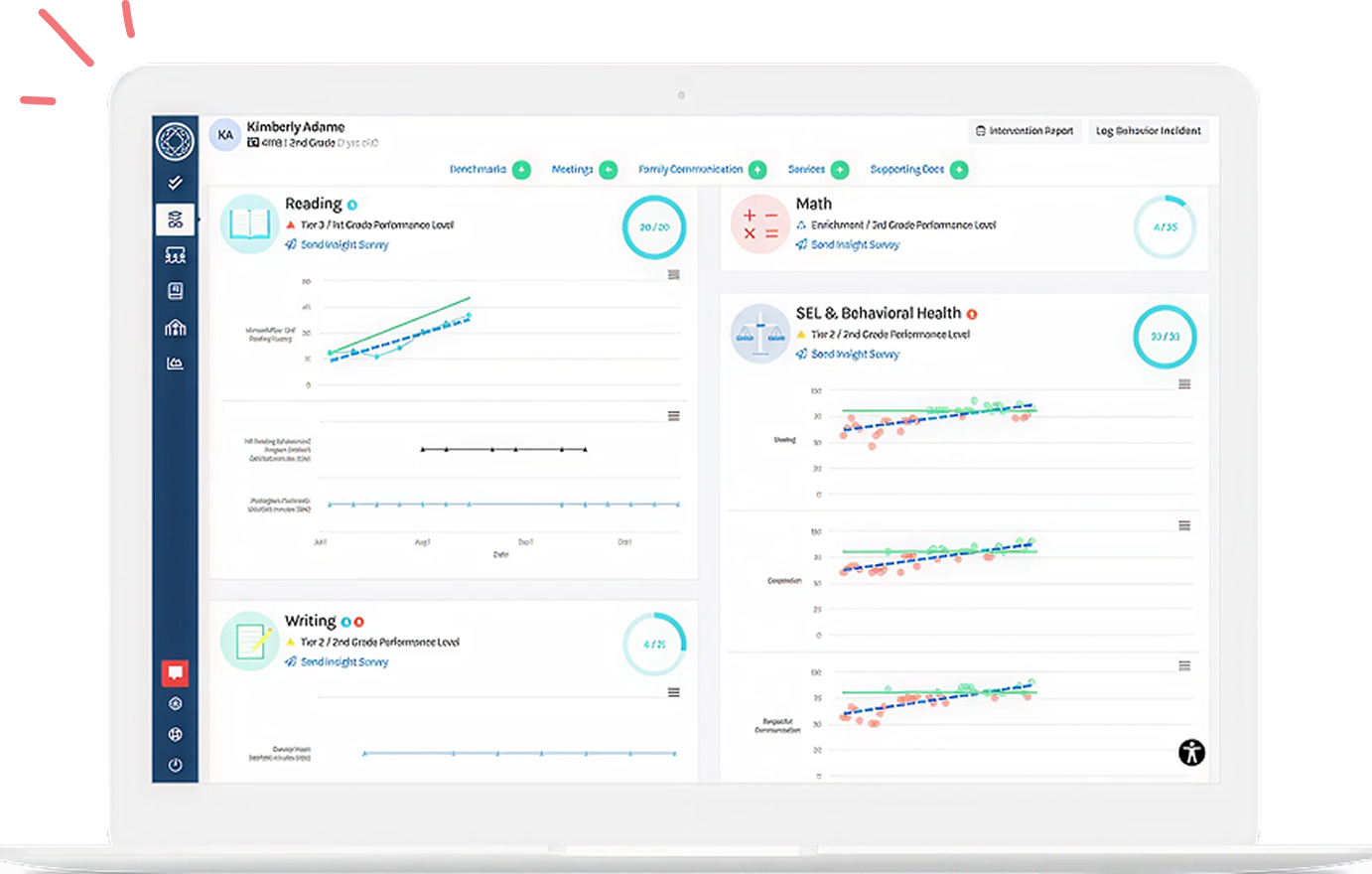As busy educators, it’s hard to find time to read, let alone sift through the thousands of different resources available, to get the most out of the reading time we do have. At Branching Minds, we try to stay as current as possible with the literature and best practices in the field, so you don’t have to. We compiled a list of what we believe to be the most useful books for your MTSS practice. What’s even better: all of these books are relatively quick to read, include many case studies or real-life examples, and are easily broken down by chapter. If you can’t read a whole book at once, narrowing it down to one component can be easily done with these resources. We love these books and hope you find one in the list below that will be helpful to you.
For reference to key MTSS terms, check out this blog: Demystifying the MTSS Mystery.
1. Practical Handbook of Multi-Tiered Systems of SupportAuthors: Rachel Brown-Chidsey & Rebekah Bickford
For any educator looking to build a solid understanding of MTSS, I recommend you take the time to read Brown-Chidsey and Bickfords’ Practical Handbook of Multi-Tiered Systems of Support. The school psychologists break their guidebook into six key components:
- school-based prevention science
- the importance of collaboration and teams
- making change happen
- effective instruction within an MTSS
- MTSS organizational structure and connecting an MTSS to other supports.
The authors effectively break down complex jargon into layman's terms and provide easily digestible information quickly to practice. Furthermore, they do an excellent job synthesizing all the knowledge of key thought leaders in the field. The text includes historical information on the evolution of educational support in school and provides the reasoning behind many of the best practices educators have come to know. While it is full of a vast array of information, it frames each concept into a logical framework that makes each aspect of MTSS practicable. This book is recommended at every level, from graduate students to teachers to superintendent and school board members. Keep this on your bookshelf for reference, as you’ll be using it often.
2. The Practice of Adaptive Leadership
Authors: Ronald Heifetz, Alexander Grashow, Marty Linsky
While this book is not specific to the topic of MTSS, it is critical for team members leading an MTSS initiative to read. Understanding the essential role of the systems in MTSS is what differentiates many school success stories from failures. While there is a necessary technical knowledge base that schools must have to effectively implement MTSS, more critical to success is understanding how the people within a school system interact and are impacted by change.
Heifetz, Grashow, and Linsky distinguish the difference between an adaptive and technical change in any organization. They then give you a lens from which any member of an organization can diagnose the political landscape of a system, determine the best path towards intervention, and the nature of productive struggle when an intervention is presented.
No matter how well-intentioned, educators often try to better their schools without realizing the many competing interests at play. While MTSS is proven to improve student and school performance, the requirements to do so effectively can be intimidating and overwhelming to those who don’t have a deep understanding. Therefore, sensitivity on the part of all change agents is necessary to navigate the adaptive changes required to progress. It is highly recommended that all MTSS Teams/Leadership Teams read this book at any point in their journey towards a fully operational Multi-Tiered System of Support.
We reference this book in another blog post as well, Leadership During Change and For Continuous Improvement.
➡️Related resource: Leadership and the System-Level Work in MTSS
3. Teach Like a Champion 3.0
Author: Doug Lemov
When considering the three tiers of support in MTSS, we often imagine a pyramid filled with red, yellow, and green. A common misconception for some may be to believe that RTI/MTSS only relates to the yellow/red 30% of students. Instead, our curriculum must utilize best practices at Tier 1 for the 80% of students who are considered “typically developing.” This book is essential for any teacher who wishes to optimize their classroom for instruction. The techniques discussed encourage effective behavior management strategies, procedures, routines, priming, and participatory strategies that maximize student engagement.
Often, when more and more students appear to become non-responsive to the curriculum, teachers should consider (re)trying a strategy in this book. The ability to pivot instructional strategies and keep classroom practices new and interesting allows students to remain excited about coming to school every day. Moreover, they continue to enhance the student-teacher relationship and the relationship between the student and their classroom community. The student relationship with school and learning is consistently supported in research as correlated with academic success. Therefore, this book is essential to any educator looking to improve upon their MTSS practice.
➡️Related resource: MTSS Meeting Guide
4. Leading and Managing A Differentiated Classroom
Authors: Carol Ann Tomlinson & Marcia B Imbreau
In the same vein as Teach Like a Champion 3.0, this book looks at the tenant of MTSS that considers a robust core with differentiated instruction. As we all know, differentiation is not one-size-fits-all, and it can feel very daunting when teachers work to translate the ideology into daily practice. Many teachers report that managing a classroom with centers is often very difficult to manage from a behavioral perspective. They don’t have enough time to generate a meaningful curriculum for multiple groups in multiple subject areas. This book works towards clarifying the misconceptions and aims to provide practical strategies to make implementation more manageable. Written by teachers and for teachers, this book is essential for every educator’s bookshelf.
5. Essentials of Evidence-Based Academic Interventions
Authors: Barbara J. Wendling & Nancy Mather
6. Essentials of Social Emotional Learning (SEL)
Author: Donna Lord Black
Scheduled for release in October 2021
The Essentials series by Wiley Publishers include 75+ books that are written by leaders in the field of psychology. These leaders have dedicated their lives to developing the most advanced assessment tools and practices related to human psychology. Furthermore, the educational psychologists who wrote these two books are experts in best practices related to academic intervention and social-emotional learning, two key pillars in education.
What is great about the Essentials series is that it is rooted in critical psychometrics but is delivered in very digestible practicable ways. Much of the content in these books has informed our product at Branching Minds. For those that want to hone the craft of school-based interventions, these two books will help all practitioners (specifically intervention specialists), special educators, EL teachers, and school-based mental health providers, enhance the quality and specificity of the provision of support in schools. While these works inform some of Tier 1, they are best targeted for intervention at Tiers 2 and 3.
Lastly
We recognize that this list does not scratch the surface of all the amazing resources available to better your practice. We tried to find books that cover different audiences, from teachers to superintendents, who all play such a critical role in impacting their school systems. We hope you found one or all of these texts meaningful. If so, let us know what your key takeaways are. We’d also love to hear what you’re reading and would be eager to feature additional books in future blogs.
Let us help you build the right team!Branching Minds offers a variety of professional learning opportunities for states, districts, and schools to ensure instructional leaders, specialists, coaches, and teachers are able to implement RTI/MTSS as well as the BRM platform with fidelity and maximizes educators’ efforts to accelerate learning for all students. |
![[Guest Author] Lauren Schutz-avatar](https://www.branchingminds.com/hs-fs/hubfs/Team/IMG_0039%202.jpeg?width=82&height=82&name=IMG_0039%202.jpeg)
About the author
[Guest Author] Lauren Schutz
Lauren Schutz has been working in the field of education for over a decade as a teacher, school psychologist, executive functioning coach, and educational consultant. Lauren earned her B.A. in psychology from the University of Wisconsin-Madison and her M.A/EdS in school psychology at Tufts University. She most enjoys helping learners (child and adult) define their own goals for success, then encouraging them through the productive struggle that comes with growth. Ms. Schutz writes on a variety of education-related topics from her hometown in Chicago, IL.

Your MTSS Transformation Starts Here
Enhance your MTSS process. Book a Branching Minds demo today.

















.png?width=716&height=522&name=Tier%203%20Behavior%20Support%20Planning%20(preview).png)

.png?width=716&height=522&name=Behavior%20Progress%20Monitoring%20(Preview).png)